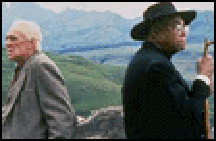Inheritors of Fear
An epic adaptation of
By Allen Barra
Alan Paton's novel Cry, the Beloved Country fits into that large category of books many of us tried to avoid reading in high school; it also belongs in the small category of books that are more rewarding when you go back to them as adults. The title comes from the book's most famous passage: "Cry, the beloved country, for the unborn child that is the inheritor of our fear." Fear, specifically fear of the South African race war to come, was much on Paton's mind when he wrote the novel in 1946 in Norway and later in San Francisco--like Joyce, Paton had to leave home to write about it.
Two generations of English teachers have hammered home the notion that Cry, the Beloved Country is some kind of well-meaning but simple-minded liberal plea for justice. In fact, the book is much more complex than its literary model, Steinbeck's The Grapes of Wrath. At its best, Cry, the Beloved Country moves in literary territory occupied by Faulkner, and Paton has an even great theme: The blacks of South Africa were not only beginning to struggle against apartheid but against the disintegration of the Zulu tribal culture that modernization was causing. The black minister Stephen Kumalo, the "Umfundisi" (parson, or father) of the novel, is a man struggling not only to save members of his own family but to understand the tide of change pulling his people from the countryside to the city.
There have been several semi-successful adaptations of the book, including a musical version, Lost in the Stars, by Maxwell Anderson and Kurt Weill, and a 1951 British film by Zoltan Korda, which featured a promising young black actor named Sidney Poitier as Kumalo's son. But none achieved anything approaching the scope and sweep of what the 32-year-old South African director Darrell James Roodt has done with this version. Certainly nothing in Roodt's work up to now--neither the competent Sarafina! nor the incompetent Patrick Swayze vehicle Fatherhood has suggested the ability to carry off such a project. But then, in his previous films, he didn't have this material and this cast.
James Earl Jones plays Kumalo, who comes to Johannesburg to bring his sister home and to find his son, only to discover that the boy has shot and killed a white man during a burglary. The dead man, Arthur Jarvis, is revealed to have been one of South Africa's most progressive thinkers and opponents of apartheid; the damage to the back population caused by a random act of violence from a scared teenager is incalculable.
The dead man's father, a rancher named James Jarvis, played by Richard Harris, is not a liberal, though after he recovers from his initial grief, we see that he is not filled with hatred either. Cry, the Beloved Country wouldn't work if James Jarvis were really a racist; his gradual revelation of the value of his son's work would seem too pat and unconvincing.
If there's a serious flaw in Roodt's and screenwriter Ronald Harwood's conception, it's in simplifying Paton's vision. Paton was aware as even few blacks in the late 1940s were that the most serious problem facing South African black was not racism per se but the breakdown of tribal life and values brought on by the lure of the industrial cities. Paton's insight was that apartheid was bolstered by the miseries exacted by industrial poverty rather than the other way around. The film see things, literally, as black and white, and in simplifying Paton's vision this way, Roodt also distorts it.
But David Lean's historical epics were oversimplified too, and Cry, the Beloved Country has the same grand, tragic feel as Lawrence of Arabia and Doctor Zhivago without the bombast. It has the sense of personal tragedy placed squarely in a historial context that distinguishes the very best epics.
[ Metro | Metroactive Central | Archives ]

Father Figures: Richard Harris (left) and James Earl Jones in "Cry, the Beloved Country"
'Cry, the Beloved Country'
From the Dec. 14-20, 1995 issue of Metro
